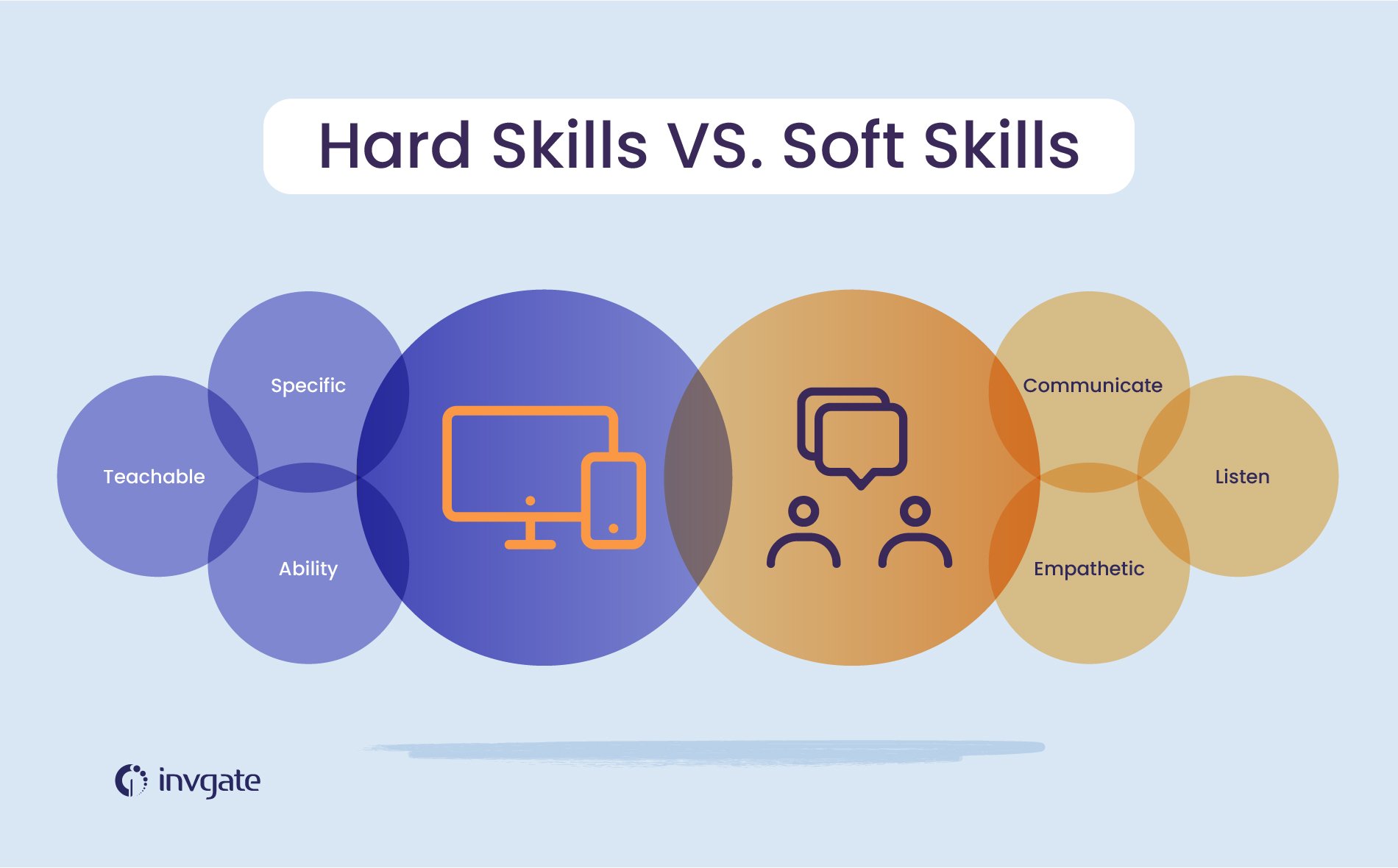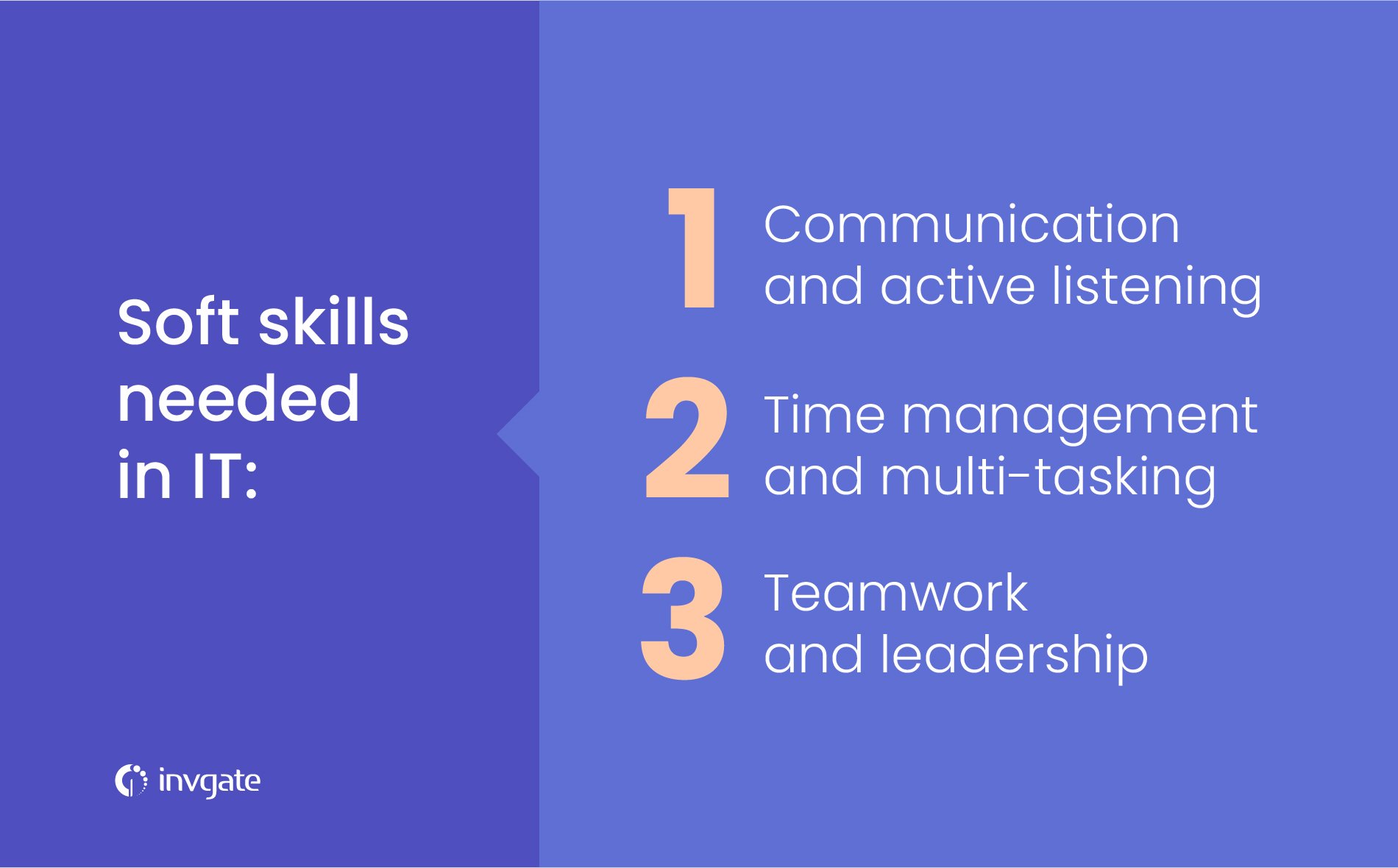When you think of the necessary skillset to operate and excel in the world of IT (and certainly in the world of IT Service Management), chances are your brain automatically defaults to what is known as "hard skills." Easily quantifiable, specific expertise on tools and languages. But of course, that doesn't paint the full picture of what is needed to become a well-rounded IT professional able to effectively communicate with teammates and stakeholders.
Though many skills are pertinent to specific niche areas like coding in programming positions or knowing how to operate a bulldozer in the construction business, there are other universal skills that aren’t necessarily related to specific jobs. This divide between specific know-how and general all-encompassing skills is what brought forth the need to split them into two categories: soft skills and hard skills. In this article, we’ll learn what these skills are as well as how they apply to the world of IT.
What do we call "hard skills"?
Hard skills are easily quantifiable skills that often involve getting a degree or going through certified training. Think specific abilities that an employee has trained for or technical skills that can only be acquired through hands-on experience and knowledge in the field. Shop clerks must know how to operate a cash register, while a bank manager must be well-versed in economy and finance. An example of these skills in the world of IT would be knowing Java or C++ for a developer position, for instance.
This would be the very first thing that an employer will look at in a resume since these skills are the backbone of any job position. However, through the years, these sets of skills have been paired with a whole new category of skills that are just as important. This is where soft skills come into play.
What do we call "soft skills"?
Soft skills are what is often referred to as “people skills”. These range from interpersonal skills such as communication, leadership, and persuasion, to intrapersonal skills such as self-awareness, emotional intelligence, and patience. Soft skills have become increasingly important through the years since they aid in improving and nurturing a healthy and positive work environment. You might be an absolute tech wizard, but what is it worth if you’re unable to communicate clearly and effectively? Thus, in IT (and specifically in the service desk), employees who have these soft skills are paramount to the success of any organization.
Soft skills are a tad trickier to pin down though. While you’d rely on documentation such as degrees or certifications to see if an employee would be fit for the job in terms of hard skills, there isn’t a certificate that tells you if a prospect will be a pain to be around or if they’ll be an assertive communicator. Consequently, it doesn’t hurt to be inquisitive when interviewing these potential employees in order to see if their soft skills are in check.
Their levels of empathy and willingness to learn can definitely be ascertained in the selection phase with non-invasive questions such as: “How would you deal with an angry customer?” or “What new skills are you most excited to learn in this position?” Having a good handle on this will increase your chances of a positive employee experience as well as collaboration as a whole.
Of course in IT, there’s a few specific hard and soft skills you want to be on the lookout for and that leads us to our next segment...

Hard skills needed in the service desk
Working knowledge of office automation products, databases, and remote control
Since service desk professionals are getting tickets almost every time, having extensive knowledge of database management and automation is essential for a position in a company’s service desk branch. This prevents the employee from getting cluttered with tickets and also allows them to easily and efficiently manage said tickets. Moreover, for those who need a more hands-on approach with customers, knowledge of the use of remote control applications is also critical to their success.
Extensive hardware knowledge and ability to deploy, configure, and software applications on desktop and mobile
This is a bit broader. Oftentimes, service desk employees will encounter different challenges, most of which go beyond issues such as the company’s website or account log-in troubleshooting. A good service desk employee knows the ins and outs of how all the aforementioned devices work to provide the best possible support and asses if hardware or software might be the source of the issue.
Knowledge of networking technologies i.e. TCP/IP, LAN/WAN
Last but certainly not least: knowing how to work with networking technologies. Data is the new gold and following that metaphor, you want your prospector to know how to identify, classify, protect, and swiftly deliver your precious gold.
Soft skills needed in the service desk
Communication and active listening
This is hands down the most important soft skill in service desk. Service desk employees must always show effective communication skills. Getting their point across efficiently and being clear in their explanations will guarantee customer satisfaction consistently. This also includes the art of active listening. This is particularly important for service desk manager jobs. Every employee is different but what separates good employees from outstanding employees is their ability to make the customer feel like they are being heard and that their problem is as important as everybody else’s.
Time management and multi-tasking
As stated before, managing loads of tickets and dealing with multiple customers simultaneously can be cumbersome. But for employees with good time management and multi-tasking skills, this problem is significantly mitigated. These two go hand in hand since more often than not one complements the other.
Good time management includes having a well-organized schedule or being strategic with time according to the challenges of a given shift. Multi-tasking is especially needed when time management is certainly not enough and multiple activities start stacking one on top of the other. When an employee strikes a good balance of these two skills then they are pretty much set.
Teamwork and leadership
Though it may not always seem like it to the naked eye, Service Desk problem-solving is not an individual feat. This is a tiered system, tickets are constantly being resolved, elevated, and delegated among co-workers. Consequently, nurturing a solid and enduring professional relationship with team members is something that should always be in an employee’s mind. Sharing is caring and this also applies to workload. Thus, job seekers who put this skill on display are attractive to potential employers.
The same goes for leadership. Spearheading a team towards success requires a strong will and resilience in the face of obstacles. This is a cocktail of social skills that employers are always on the lookout for.

Frequently asked questions?
Which is more important, hard skills or soft skills?
The answer may vary depending on the area of IT that you are scouting for. In the specific case of service desk positions, however, soft skills are definitely the most important. This doesn’t mean that you should neglect hard skills, but rather keep an eye out for interpersonal and communicational skills above all. When in doubt about this, ask yourself the question “How much interpersonal communication does this position entail?” That is a quick and easy way of assessing which kind of skills are most necessary for the position you are looking to fill.
How do I deal with employees who lack hard skills or soft skills?
There is a delicate balance between hard and soft skills so it’s normal to have these types of concerns. If one of your employees is lacking in the hard skills department then you should consider training as a viable option. Tutelage, guidance, or even assigning a mentor can also work wonders. Remember, these skills are based on easily quantifiable information so you’ll also be able to see the progress clearly as your employee improves.
With soft skills, you need to be a little bit more inventive. Since these skills vary a lot from employee to employee, establishing direct and cristal clear communication with them is the top priority. Regular one on ones and performance reviews with positive feedback can truly help in helping them overcome shortcomings in terms of soft skills.
If you are working with a team, coming up with team-building activities is also a great alternative. Remember that soft skills are “people skills” and as such, the best way to train them is for someone with good people skills to be at the helm of these endeavors.















